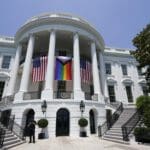What another Trump Supreme Court pick would mean for LGBTQ rights
Another Trump justice could mean the dismantling of hard won LGBTQ rights.

Donald Trump and Senate Republicans are moving quickly to get another one of his Supreme Court nominees confirmed, following the death of Justice Ruth Bader Ginsburg on Friday.
Trump has said he will announce his pick on Saturday, and that the nominee will be a woman.
Trump’s previously announced Supreme Court shortlist is chock full of potential nominees with ties to anti-LGBTQ groups, who have opposed LGBTQ equality publicly, or those who have argued against LGBTQ rights in court. Senate Republicans currently have the votes they need to confirm whoever Trump selects as his nominee.
Experts say there are a number of ways any Trump-chosen justice could imperil progress on LGBTQ equality.
The religious right could more effectively weaponize arguments claiming to protect religious freedom to tear down LGBTQ nondiscrimination protections, they say. The court could also undermine Americans’ right to protest, which would damage the LGBTQ movement’s effectiveness. And the court could take up cases relating to LGBTQ married couples’ rights.
One major LGBTQ rights case is scheduled to come before the court right after Election Day.
Arguments for Fulton v. City of Philadelphia will be heard on Nov. 4. At issue is whether private agencies that receive taxpayer funding, which includes foster care providers, homeless shelters, and food banks, can opt out of nondiscrimination requirements. The case involves a group of foster parents and Catholic Social Services who have challenged a policy by the city of Philadelphia to stop referrals of foster children to the group due to its refusal to certify same-sex couples as foster parents.
Leslie Cooper, deputy director of the ACLU’s LGBT & HIV Project, said the stakes in this case are very high.
“What the other side is asking for in this case, if accepted by the court, means that any future government at the federal level or state or local level would not constitutionally be permitted to enact those nondiscrimination protections,” she said.
Sharita Gruberg, senior director for the LGBTQ research and communications project at the Center for American Progress, said she’s worried about another upcoming case that challenges the constitutionality of the Affordable Care Act and a case that involves the imprisonment of young people for life without parole.
“Sixty-five percent of LGBTQ people have pre-existing conditions. And for folks who had COVID-19, they now have a pre-existing condition even if they didn’t before,” Gruberg said. “The ACA helped us significantly close the un-insurance gap for LGBTQ people but cost and discrimination continue to be barriers to accessing needed care. The thought that the Supreme Court could eliminate this progress in the midst of a global pandemic is truly terrifying.”
Gruberg added that she is similarly concerned about Jones v. Mississippi, a case that centers around the Eighth Amendment and whether juveniles can be imprisoned for life without parole, since LGBTQ people are overrepresented throughout the criminal justice system and nearly 60% of incarcerated girls are sexual minorities.
As for voting rights, it’s unclear when the Supreme Court will take up a such a case. Still, transgender people already face numerous barriers to cast their ballot and their ability to vote could be further harmed by justices that would limit voting rights, said Jenny Pizer, law and policy director for Lambda Legal.
Barbara Lagoa, a U.S. circuit judge on the Court of Appeals for the 11th Circuit, is on Trump’s shortlist and has supported poll taxes in the past. In that case, people with felonies were required to pay fines and fees associated with their sentence before voting. For this reason, Pizer said she is worried about a potential Lagoa nomination.
There are many other issues involving the LGBTQ community on which the Supreme Court could soon make crucial decisions, Gruberg said. Although the landmark Bostock v. Clayton County decision earlier this year was a huge win for LGBTQ equality, prohibiting employee discrimination on the basis of sexual orientation or gender identity, there are still many outstanding issues for justices to consider.
“While we won protections in employment, there are still cases winding their way up on protections under other sex discrimination laws, like in education and health care,” Gruberg said. “We can’t assume the Court will extend protections to LGBTQ people in all of these arenas. And again, all of these protections could be gutted by overly expansive religious exemptions and permitting discriminatory treatment of transgender people.”
She added that she will be watching reproductive rights cases closely as well, since LGBTQ people also use birth control, can also become pregnant, and get abortions.
Trump’s new pick could also rule on cases relating to marriage equality. Although Pizer said she doesn’t think the Supreme Court would overturn marriage equality, that doesn’t mean the issue has been resolved entirely.
Many queer couples still struggle to receive survivor’s benefits, for example. The Social Security Administration’s requirement that couples be married for nine months to receive survivor’s benefits means that some couples in states with same-sex marriage bans who married quickly after the court’s 2015 Obergefell v. Hodges ruling were still unable to receive benefits, as their spouses died before their marriages reached the nine-month mark.
While a federal district court ruled in favor of these couples in May, there are still other similar cases in the pipeline.
The Trump administration has also fought cases involving married same-sex couples who have requested U.S. passports for their children who were born overseas. A federal judge recently ruled that the State Department must recognize the U.S. citizenship of those children, but there is a possibility these cases could still come before the court.
Pizer is also concerned about the court taking up ministerial exception cases, which would also expand so-called religious liberty at the cost of LGBTQ people and other marginalized people’s rights. A proposed rule that would raise the standard for immigration judges to grant asylum claims, for instance, would greatly harm LGBTQ people seeking asylum, Pizer added, another issue the court could take up.
The movement for LGBTQ equality could face other obstacles from a more conservative Supreme Court. After months of protests against police violence, there are many new cases for courts to consider on the issue of protesters’ rights and the suppression of such demonstrations, Politico reported.
“We’re looking at a moment where there may be no effective check on reactionary impulses and uses of power that we haven’t seen for a very long time,” Pizer said. “So when we think about the First Amendment, the right to organize, the right to petition the government for redress of grievances, the right to speak, this is the foremost reason the LGBTQ movement has been able to organize and grow from earliest days.”
She added, “We may be a whisper from effectively losing the right to have a civil rights movement or to have an environmental justice movement or health care rights or anything. We really may be a whisper from a totalitarian state.”
Amy Coney Barrett, a judge on the U.S. Court of Appeals for the Seventh Circuit, is reportedly Trump’s favored choice for the court, which concerns LGBTQ advocates.
Among those concerns is Barrett’s support for the idea that “marriage and family are founded on the indissoluble commitment of a man and a woman” and “the significance of sexual difference and complementarity of men and women,” Gruberg said. She said Barrett’s silence on whether she will set aside her personal views to uphold landmark decisions is also worrisome.
Barrett has also spoken at the Blackstone Legal Fellowship, which is run by Alliance Defending Freedom, an anti-LGBTQ group. In 2017, 27 LGBTQ organizations sent a letter to the chair and ranking member on the Senate Committee on the Judiciary to oppose Barrett’s confirmation as a circuit court judge.
Published with permission of The American Independent Foundation.
Recommended

Alaska House committee advances, expands proposal to bar trans girls from girls sports
Amended bill would add elementary, middle school and collegiate sports to limits in place for high school
By Claire Stremple, Alaska Beacon - April 16, 2024
Bills targeting trans people are on the rise nationwide and in Alaska — most focus on children
House committee advances legislation that would restrict the rights of Alaska trans kids
By Claire Stremple, Alaska Beacon - April 01, 2024
Anti-abortion, anti-LGBTQ resolutions to be voted on at state Republican convention
A resolution to be considered by North Dakota Republican Party delegates at their upcoming convention would define life as beginning at fertilization and call for criminal penalties for “anyone who kills a pre-born human being.”
By Michael Achterling, North Dakota Monitor - March 26, 2024









































































